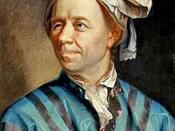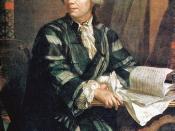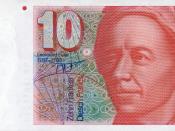Euler, Leonhard (1707-83), Swiss mathematician, whose major work was done in the field of pure mathematics, a field that he helped to found. Euler was born in Basel and studied at the University of Basel under the Swiss mathematician Johann Bernoulli, obtaining his master's degree at the age of 16. In 1727, at the invitation of Catherine I, empress of Russia, Euler became a member of the faculty of the Academy of Sciences in Saint Petersburg. He was appointed professor of physics in 1730 and professor of mathematics in 1733. In 1741 he became professor of mathematics at the Berlin Academy of Sciences at the urging of the Prussian king Frederick the Great. Euler returned to St. Petersburg in 1766, remaining there until his death. Although hampered from his late 20s by partial loss of vision and in later life by almost total blindness, Euler produced a number of important mathematical works and hundreds of mathematical and scientific memoirs.
In his Introduction to the Analysis of Infinities (1748; trans. 1748), Euler gave the first full analytical treatment of algebra, the theory of equations, trigonometry, and analytical geometry. In this work he treated the series expansion of functions and formulated the rule that only convergent infinite series can properly be evaluated. He also discussed three-dimensional surfaces and proved that the conic sections are represented by the general equation of the second degree in two dimensions. Other works dealt with calculus, including the calculus of variations, number theory, imaginary numbers, and determinate and indeterminate algebra. Euler, although principally a mathematician, made contributions to astronomy, mechanics, optics, and acoustics.


